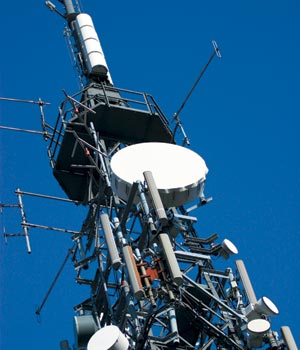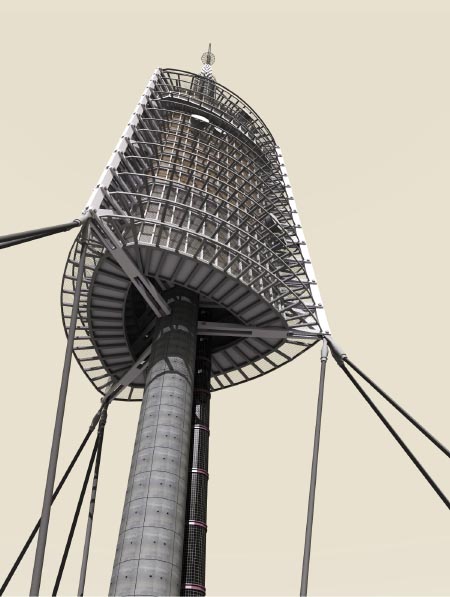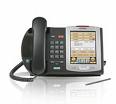IP TELEPHONY
IP telephony (Internet Protocol telephony) is a general term for the technologies that use the Internet Protocol's packet-switched connections to exchange voice, fax, and other forms of information that have traditionally been carried over the dedicated circuit-switched connections of the public switched telephone network (PSTN). Using the Internet, calls travel as packets of data on shared lines, avoiding the tolls of the PSTN. The challenge in IP telephony is to deliver the voice, fax, or video packets in a dependable flow to the user. Much of IP telephony focuses on that challenge.
IP telephony service providers include or soon will include local telephone companies, long distance providers such as AT&T, cable TV companies, Internet service providers (ISPs), and fixed service wireless operators. IP telephony services also affect vendors of traditional handheld devices.
Currently, unlike traditional phone service, IP telephony service is relatively unregulated by government. In the United States, the Federal Communications Commission (FCC) regulates phone-to-phone connections, but says they do not plan to regulate connections between a phone user and an IP telephony service provider.
VoIP is an organized effort to standardize IP telephony. IP telephony is an important part of the convergence of computers, telephones, and television into a single integrated information environment. Also see another general term, computer-telephony integration (CTI), which describes technologies for using computers to manage telephone calls.
IP telephony provides a way for you to extend consistent communications services to all your employees in their workspaces, whether they are in main campus locations, at branch offices, working remotely, or are mobile. IP telephony transmits voice communications over the network using open-standards-based Internet Protocol.
Cisco IP telephony solutions are an integral part of Cisco Unified Communications, which unify voice, video, data, and mobile applications on fixed and mobile networks enabling users to easily communicate in any workspace using any media, device, or operating system. Using the network as the platform, Cisco IP telephony solutions help organizations of all sizes realize greater security, resilience, and scalability in addition to the inherent benefits of using a converged network for transport and interconnection. Use Cisco IP telephony solutions to:
- Provide secure, reliable, scalable communications that take advantage of your LAN and WAN
- Improve employee agility and productivity through integration with innovative Cisco Unified Communications and third-party applications.
What are IP Phones / IP Telephones?
The implementation of an IP telephone system in a business requires the use of a very specific type of phone: the IP Telephone. IP Phones are sometimes called VoIP telephones, SIP phones or softphones. These are all the exact same thing and are based on the principle of transmission of voice over the internet, or what is better known as VoIP (or voice over internet protocol) technology. IP Telephones come in several types. Learn more about the different kinds of IP phones.Most popular IP Phones are supported by 3CX Phone System for Windows. Information on which IP Telephones can be used with 3CX IP PBX and detailed configuration guides are available.
What is a PBX Phone System?
PBX stands for Private Branch Exchange, which is a private telephone network used within a company. The users of the PBX phone system share a number of outside lines for making external phone calls. A PBX connects the internal telephones within a business and also connects them to the public switched telephone network (PSTN). One of the latest tendencies in PBX phone system development is the VoIP PBX, also known as IP PBX, which uses the Internet Protocol to transmit calls. Nowadays, there are four different PBX phone system options:
- PBX
- Hosted/Virtual PBX
- IP PBX
- Hosted/Virtual IP PBX
IP PBX is a software-based PBX phone system solution which helps accomplish certain tasks and delivers services that can be difficult and costly to implement when using a traditional proprietary PBX. 3CX Phone System for Windows is a good example of an IP PBX phone system.
What is an IP PBX?
An IP PBX is a complete telephony system that provides telephone calls over IP data networks. All conversations are sent as data packets over the network.
The technology includes advanced communication features but also provides a significant dose of worry-free scalability and robustness that all enterprises seek. The IP PBX is also able to connect to traditional PSTN lines via an optional gateway - so upgrading day-to-day business communication to this most advanced voice and data network is a breeze! Enterprises don’t need to disrupt their current external communication infrastructure and operations. With IP PBX deployed, an enterprise can even keep its regular telephone numbers. This way, the IP PBX switches local calls over the data network inside the enterprise and allows all users to share the same external phone lines.
How it works
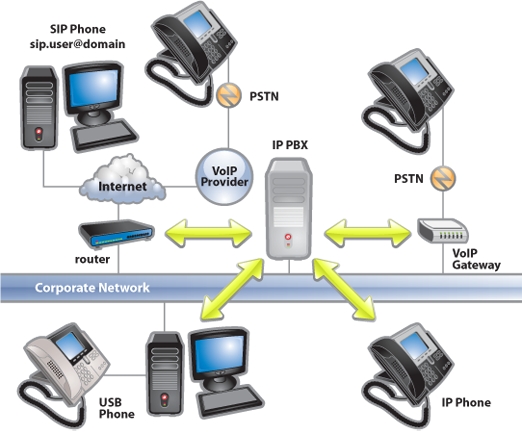
Figure 1 - How an IP PBX integrates into the network
An IP PBX or IP Telephone System consists of one or moreSIP phones, an IP PBX server and optionally a VOIP Gateway to connect to existing PSTN lines. The IP PBX server functions in a similar manner t o a proxy server: SIP clients, being either soft phones or hardware-based phones, register with the IP PBX server, and when they wish to make a call they ask the IP PBX to establish the connection. The IP PBX has a directory of all phones/users and their corresponding SIP address and thus is able to connect an internal call or route an external call via either a VOIP gateway or a VOIP service provider. More information and commonly asked questioned about IP PBXs can be found on IP PBX, SIP & VOIP FAQ.
What are SIP Phones?
SIP Phones are the same thing as VoIP Phones or soft phones. These are telephones that allow phone calls to be made using VoIP (voice over internet protocol) technology.
There are two types of SIP Phones. The first type is the hardware SIP phone, which resembles the common telephone but can receive and make calls using the internet instead of the traditional PSTN system.
SIP Phones can also be software-based. These allow any computer to be used as a telephone by means of a headset with a microphone and/or a sound card. A broadband connection and connection to a VOIP provider or a SIP server are also required.
3CX Phone System for Windows can be used with most popular hardware SIP Phones. It also comes with a completely FREE software-based SIP Phone that functions as a VoIP Client for 3CX phone system.
Example of SIP Call session between 2 phones
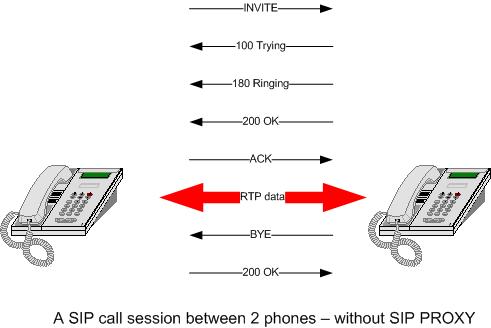
A sip call session between 2 phones is established as follows:
- The calling phone sends out an invite
- The called phone sends an information response 100 – Trying – back.
- When the called phone starts ringing a response 180 – Ringing – is sent back
- When the caller picks up the phone, the called phone sends a response 200 – OK
- The calling phone responds with ACK – acknowledgement
- Now the actual conversation is transmitted as data via RTP
- When the person calling hangs up, a BYE request is sent to the calling phone
- The calling phone responds with a 200 – OK.
What are the benefits of an IP PBX?
- Much easier to install & configure than a proprietary phone system
- Easier to manage because of web based configuration interface
- No need for separate phone wiring
- Allows users to hot plug their phone anywhere in the office - users simply take their phone, plug it into the nearest ethernet port and keep their existing number!
- Allows easy roaming - calls can be diverted anywhere in the world because of the SIP protocol characteristics
- Significant cost reduction by leveraging Internet
- SIPstandard eliminates proprietary, expensive phones
- Scalable
- Better reporting
- Better overview of system status and calls
- More IP PBX benefits
TOP»
|







